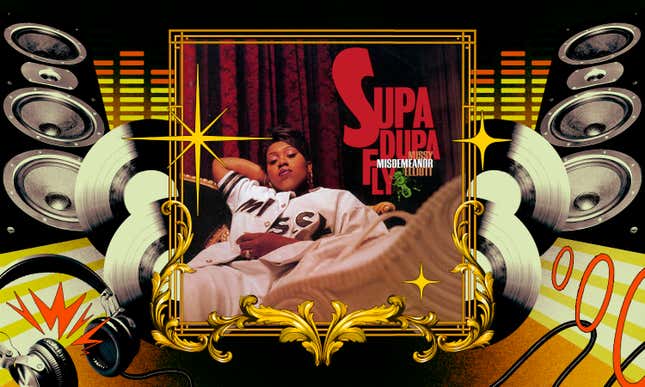
This week at VSB, we’re running a series called Albums That Changed My Life in which different writers let you in on the music that helped shape and mold them into the people they are now. Today we hear from Ashlee Haze as she tells us lessons she learned from Missy Elliott’s Supa Dupa Fly.
Urban Dictionary defines “fly” (adj.) as “cool, in style.” Let’s be honest—Missy Elliott could have stopped there. But she knew that there was something more—something “supa dupa” about this masterpiece of an album. Afrofuturism. Feminism. Body positivity. All terms that would elude 8-year-old me until more than a decade after experiencing Missy’s Supa Dupa Fly in all its glory. Even though I didn’t have the formal language for what I was experiencing, I knew how to call it magic.
I was introduced to Supa Dupa Fly via the video for the title track, “The Rain (Supa Dupa Fly).” I sneaked in my room to watch it on MTV’s TRL in the way most pubescent kids watch scrambled porn on channel 99—I didn’t know exactly what I was looking at, but I knew I wanted in on the action. Who was this fat black woman in the trash bag, and how could I get to know more about her? Who had the keys to the Jeep, and why wouldn’t they come forward?
I had questions that needed answers, dammit. And the answers were there, between Timbaland’s drums and Missy’s seamless transitions from singing to emceeing. I just needed to be a student. In hindsight, I realize I probably had no business listening to this at the time. Who knew Da Brat wasn’t talking about swimming when she mentioned the backstroke in “Sock It to Me”? Some days I think I found Missy before I was ready. I also recognize that some of the best things in life you can’t get ready for.
One of the lessons Supa Dupa Fly teaches is the necessity of women’s voices. It would have been easy for Missy to exclude women from her narrative and to write other female emcees off as catty, like many have done before her, and just make hits with Timbaland.
I think Missy knew what so many didn’t—that another chair at the table doesn’t mean everybody can’t eat. Another light in the room doesn’t make yours dimmer. The smoky voice of the late Aaliyah, coupled with Missy’s alto, creates what the kids today would call “a vibe.” Da Brat, Space, Mocha and Lil’ Kim slay the dragon of ladylikeness and are heroes in their own right. So please, tell me again how there isn’t room for women in hip-hop, and I’ll show you a good fiction story.
Fourteen years after the release of Supa Dupa Fly, I found myself stuck in Atlanta traffic listening to the “old-school” hip-hop station, and I was reminded again of its power. I began to craft a poem about my initial encounter with the album, having no idea the poem, like Missy, would ultimately change my life.
I wrote “For Colored Girls Who Don’t Need Katy Perry When Missy Elliott Is Enough” as an ode to an era. I did not imagine that the poem would go viral and quite literally bring Missy to my front door. It’s one of those stories I hear and forget the main character is me. The story of the black girl who wins. Thank you, Missy, for showing me what winning looks like. For making me believe that I, too, am supa dupa.

